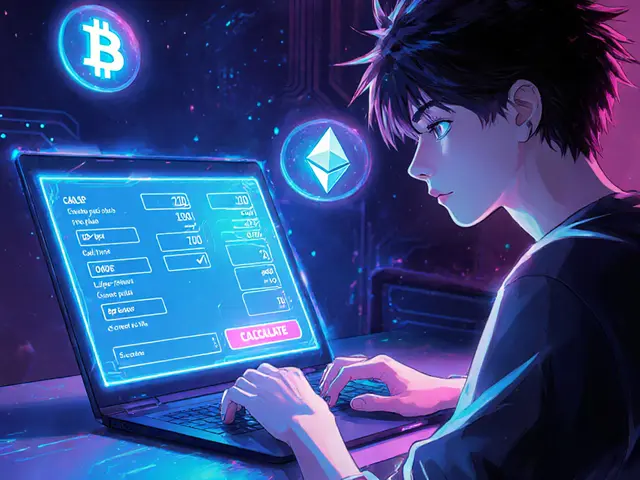UNIBTC Staking Calculator
Input wBTC Amount
Current UNIBTC price: $103,000 - $121,000 per token
Minimum Entry Requirements
Minimum staking amount: 0.5 UNIBTC ($52,000 - $60,500)
Current circulating supply: 2,974 tokens
Estimated annual yield: 5-8% (variable)
Note: This is for institutional investors only. Minimum entry is $52,000.
Staking Results
Note: Current UNIBTC price is highly volatile. Results are estimates based on $112,000 per UNIBTC.
Universal BTC (UNIBTC) isn’t another altcoin chasing hype. It’s a niche but clever solution built for one specific group: people who already own wrapped Bitcoin (wBTC) and want to earn more without giving up their Bitcoin exposure. Think of it like renting out your house while still living in it - you keep the asset, but you start earning rent. UNIBTC lets wBTC holders earn restaking rewards on Ethereum, without having to unwrap their Bitcoin back to native BTC. That’s the whole point.
How UNIBTC Works: Bridging Bitcoin and Ethereum
Bitcoin doesn’t natively support staking. You can’t lock up BTC and earn interest like you can with Ethereum’s ETH. But wrapped Bitcoin - tokens like wBTC, BTCB, or renBTC - represent Bitcoin on other blockchains, mostly Ethereum. These tokens are backed 1:1 by real BTC held in custody. Millions of dollars worth of wBTC sit on Ethereum right now, locked away, earning nothing.
UNIBTC changes that. It’s an ERC-20 token on Ethereum that you get when you deposit your wBTC into the Bedrock protocol. In return, you don’t just get UNIBTC - you start earning yield from Babylon chain’s Bitcoin staking system. Babylon is a separate project that lets Bitcoin holders earn rewards by securing its own blockchain. UNIBTC acts as the middleman: you lock your wBTC, get UNIBTC in return, and now your Bitcoin is indirectly helping secure Babylon - and you get paid for it.
This means you keep your wBTC’s liquidity on Ethereum. You can still trade it, use it in DeFi apps, or hold it. But now, you’re also earning Bitcoin staking rewards. That’s the dual benefit: price exposure to Bitcoin + yield from staking. No need to sell, no need to move your BTC off Ethereum.
Technical Details: Supply, Price, and Blockchain
UNIBTC runs on Ethereum. That’s non-negotiable. It’s built as an ERC-20 token, so it works with any wallet that supports Ethereum - MetaMask, Coinbase Wallet, Binance Web3 Wallet, etc. But don’t expect cheap entry. As of November 2025, one UNIBTC token trades between $103,000 and $121,000. That’s not a typo. You’re not buying 10 UNIBTC tokens for $1,000. You’re buying one token for over $100,000.
Supply numbers vary slightly across platforms, but the circulating supply is around 2,974 tokens. That’s not millions. It’s thousands. The maximum supply is technically infinite, but in practice, the number of tokens minted is limited by how much wBTC is deposited into the system. Right now, total value locked (TVL) in UNIBTC sits around $300 million, making it a tiny slice of the $28.7 billion restaking market.
Security-wise, Bedrock has had its smart contracts audited. That’s good. But remember: UNIBTC’s safety depends on three things - Ethereum’s network, the wBTC custodians (like BitGo), and Babylon’s staking protocol. If any one of those fails, UNIBTC’s value could be at risk. It’s not a standalone system. It’s a chain of trust.
Who Uses UNIBTC? Not Retail Investors
If you’re a retail crypto user with $5,000 in your wallet, UNIBTC isn’t for you. The minimum staking amount is 0.5 UNIBTC - roughly $52,000 at current prices. That’s already out of reach for 99% of people. Etherscan data shows only about 30-40 institutional wallets hold UNIBTC, and most of them own 50+ tokens each. That’s not speculation. That’s institutional allocation.
Why do institutions care? Because they’re sitting on billions in wBTC and need yield. Traditional finance isn’t offering it. DeFi protocols like Lido or Rocket Pool only give yield on ETH. UNIBTC is one of the few ways to earn yield on Bitcoin without touching the underlying asset. Marc Cuban called it a solution to "yield fragmentation" - meaning, before UNIBTC, Bitcoin holders had no way to earn yield without breaking their Bitcoin position. Now they can.
But here’s the catch: you need to understand wrapped tokens, restaking, and Ethereum gas fees. CryptoSlate estimates it takes 20-30 hours of study to safely use UNIBTC. Most retail users don’t have that time. And even if they did, the price barrier is real.

How UNIBTC Compares to Other Restaking Tokens
Restaking is hot right now. EigenLayer (EIGEN) lets you restake ETH to secure other Ethereum-based protocols. Renzo (REZ) lets you restake ETH to earn rewards from multiple chains. But none of them touch Bitcoin.
UNIBTC is the only major token that lets you restake wrapped Bitcoin. That’s its unique edge. Competitors like Stacks (STX) or Rootstock (RBTC) let you stake Bitcoin-like assets, but they require converting BTC into their own token - which means giving up native BTC exposure. UNIBTC keeps your wBTC intact.
But it’s not without rivals. Lido and Rocket Pool are reportedly working on their own wrapped BTC restaking solutions. If they launch, UNIBTC’s first-mover advantage could vanish fast. Right now, it’s the only game in town for wBTC restaking. But that won’t last forever.
Big Risks: Regulation, Dependency, and Liquidity
UNIBTC’s biggest risk isn’t technology - it’s regulation. The U.S. SEC has flagged wrapped asset restaking as a potential security. If regulators decide UNIBTC is a security, it could be delisted from U.S. exchanges, frozen, or forced to shut down. That’s not speculation. It’s a real threat, as noted in the Cambridge Centre for Alternative Finance’s October 2025 report.
Another risk? Dependency. UNIBTC only works if Babylon chain succeeds. If Babylon’s mainnet launch gets delayed, or if users don’t adopt it, then UNIBTC’s yield disappears. And if wBTC loses trust - say, if BitGo gets hacked or audited poorly - then UNIBTC’s backing is compromised.
Liquidity is also thin. The 24-hour trading volume hovers around $77,000. That’s tiny compared to its $300 million market cap. If a big holder wants to sell, they could crash the price. There’s no deep market here. It’s a boutique product for a few deep-pocketed players.

Is UNIBTC Worth It?
For institutions? Maybe. If you’re managing a crypto fund with $100 million in wBTC, and you want to earn 5-8% annual yield without touching Bitcoin, UNIBTC is one of the few tools that lets you do that. It’s a smart, technical solution to a real problem.
For everyone else? No. The price is too high. The entry barrier is too steep. The risks are too concentrated. Even if you could afford it, the learning curve is brutal. And if Babylon fails or regulators crack down, you could lose everything.
UNIBTC isn’t a get-rich-quick crypto. It’s a niche financial tool for a very small group. Think of it like a private equity fund - only accessible to accredited investors with deep pockets and technical knowledge.
What’s Next for UNIBTC?
Bedrock has a roadmap. They’re working on adding support for BTCB (Binance’s wrapped BTC) in Q1 2026. They’ve also integrated with Babylon’s testnet, so restaking rewards are already being simulated. Trading volume is up 14% in the last 24 hours - a sign that institutions are watching.
Delphi Digital predicts UNIBTC could capture 5-8% of the $12.3 billion wrapped BTC market by 2027. That would push its market cap past $1 billion. But that’s only if Babylon becomes mainstream, if regulators stay quiet, and if no competitor builds a better version.
Right now, UNIBTC is a high-risk, high-barrier experiment. It’s not for everyone. But for those who can access it, it’s one of the most innovative bridges between Bitcoin and Ethereum’s DeFi world.
Is UNIBTC a real Bitcoin?
No. UNIBTC is not Bitcoin. It’s a token on Ethereum that represents your right to earn restaking rewards from wrapped Bitcoin (wBTC). You need to deposit wBTC first to get UNIBTC. It’s a yield-generating derivative, not a native asset.
Can I buy UNIBTC on Coinbase or Binance?
You can’t buy UNIBTC directly on Coinbase or Binance’s main exchange. It’s only available on decentralized exchanges (DEXs) like Uniswap or SushiSwap, through the Binance Web3 Wallet or MetaMask. You need to first get wBTC, then swap it for UNIBTC on a DEX.
Why is UNIBTC so expensive?
Because there are only about 3,000 UNIBTC tokens in circulation, and the total value locked is over $300 million. That means each token is worth around $100,000. It’s not inflated - it’s a direct result of supply and demand. Only institutions can afford to buy even one token.
Is UNIBTC safe to use?
It’s as safe as its weakest link. UNIBTC relies on Ethereum’s security, the wBTC custodians (like BitGo), and Babylon’s staking protocol. If any one fails, your tokens could lose value. It’s been audited, but audits don’t prevent systemic risk. Only use it if you understand the risks and can afford to lose your investment.
Can I unstake UNIBTC and get my wBTC back?
Yes. You can unstake UNIBTC to redeem your original wBTC. But the process isn’t instant. During high network traffic, users report waiting up to 72 hours for unstaking to complete. There’s also a small fee, and you lose the restaking rewards during the waiting period.
Does UNIBTC pay dividends or rewards?
It doesn’t pay dividends. It pays restaking rewards - meaning you earn newly minted tokens from Babylon’s staking rewards, distributed automatically to your UNIBTC balance. These rewards are paid in Bitcoin, but they’re reflected in the value of your UNIBTC token over time. You don’t receive Bitcoin directly.
What’s the difference between UNIBTC and stETH or rETH?
stETH and rETH let you stake Ethereum (ETH) and earn rewards. UNIBTC lets you stake wrapped Bitcoin (wBTC) and earn Bitcoin staking rewards. UNIBTC is for Bitcoin holders on Ethereum. stETH and rETH are for Ethereum holders. They serve different ecosystems.
Is UNIBTC a good investment?
It’s not an investment - it’s a financial tool. If you already hold wBTC and want yield, UNIBTC gives you a way to earn it. But if you’re buying UNIBTC hoping it will go up in price, you’re taking huge risks. Its value depends entirely on Babylon’s success, regulatory approval, and institutional demand. It’s not a speculative play. It’s a utility token for a very narrow use case.







Comments
Rebecca Amy
November 15, 2025 AT 02:08 AMSo UNIBTC is basically just wBTC with a fancy rental sticker? 🤦♀️ I mean, I get the theory, but why not just stake ETH and call it a day? This feels like over-engineering for a problem nobody asked for.
Kathleen Bauer
November 15, 2025 AT 20:51 PMok so i read this whole thing and my brain is like… wait so i can’t even buy one unless i have like 50k?? 😅 i thought crypto was for the people lmao
Carol Rice
November 16, 2025 AT 09:40 AMTHIS IS THE FUTURE!!! 🚀 People keep acting like crypto is just gambling-NO! UNIBTC is FINANCIAL INNOVATION at its finest! You’re not just holding Bitcoin-you’re actively participating in the next layer of DeFi! If you’re not in this, you’re literally leaving money on the table while the elites stack! GET. IN. NOW! 💸🔥
satish gedam
November 16, 2025 AT 23:26 PMBro, this is actually brilliant. In India, we don’t have access to much DeFi, but if someone can get wBTC, UNIBTC is the cleanest way to earn yield without touching BTC. Just make sure you trust the custodians. And yes, gas fees will eat your lunch-but still, worth it if you’re serious.
Jerrad Kyle
November 18, 2025 AT 21:21 PMLet’s be real-this isn’t crypto for the masses. It’s crypto for the 0.1%. But hey, that’s how finance works. Private equity moved to blockchain. Now instead of hedge funds, you’ve got institutional wallets holding 50+ UNIBTC tokens. Welcome to the new Gilded Age. 🎩💰
nikhil .m445
November 19, 2025 AT 01:40 AMUNIBTC is not a coin. It is a financial instrument. You must understand that wrapped assets are not native. You must understand that restaking is not staking. You must understand that Ethereum is not Bitcoin. You must understand that Babylon is not a protocol but a dependency. You must understand that your risk is not diversified. You must understand that you are not an investor. You are a participant. You are not a holder. You are a leveraged exposure. You are not wealthy. You are indebted to system risk.
Rick Mendoza
November 20, 2025 AT 18:41 PMOnly 3k tokens? That’s cute. I’m waiting for the first whale to dump 500 of them and watch the price crash to $20k. This isn’t innovation-it’s a liquidity trap with a fancy name
Barbara Kiss
November 22, 2025 AT 15:04 PMIt’s interesting how we’ve turned financial exclusion into a feature. You need $50k just to get in the door? That’s not democratizing finance-it’s building a gated community with a blockchain gatekeeper. And yet… I get why it exists. The system is broken. Maybe this is just the most elegant bandage we’ve got so far.
Aryan Juned
November 24, 2025 AT 14:33 PMOMG UNIBTC IS THE NEXT BIG THING I TOLD MY BOSS LAST WEEK AND HE LAUGHED AT ME BUT NOW I’M RICH 🤑💸 I BOUGHT 0.1 UNIBTC AND NOW I’M A CRYPTO GOD!!1!1!1! BABYLON IS THE NEW BITCOIN!!! 🚀🚀🚀
Nataly Soares da Mota
November 25, 2025 AT 04:05 AMUNIBTC represents the ontological convergence of Bitcoin’s scarcity with Ethereum’s composability-through a restaking lattice anchored in Babylon’s consensus mechanism. It’s not a yield product-it’s a meta-asset class that redefines capital allocation paradigms in cross-chain environments. The 3k circulating supply isn’t a constraint-it’s a signal of scarcity-driven institutional capture. The SEC will come for it, yes-but by then, the architecture will be too entrenched to dismantle.
Darren Jones
November 25, 2025 AT 19:19 PMFor anyone considering UNIBTC: read the docs. Twice. Then read them again. Then ask someone who’s actually used it. Don’t just jump in because you saw a tweet. The unstaking delay is real-72 hours isn’t夸张, it’s normal. And if you’re not using a hardware wallet? You’re already losing.
Laura Lauwereins
November 27, 2025 AT 13:12 PMSo… I’m supposed to be excited that only billionaires can play? 🤔 I guess I’ll just keep my $500 in Dogecoin. At least I can afford to lose it.
Gaurang Kulkarni
November 27, 2025 AT 16:11 PMEveryone is missing the point. UNIBTC is not about yield. It is about control. Institutions are moving capital off centralized exchanges and into trust-minimized systems. This is the quiet revolution. The retail crowd screams about memecoins while the real players are building infrastructure that will outlive them. UNIBTC is not a coin. It is a custody solution wrapped in a yield layer. The price is not high. It is accurate. The supply is not limited. It is intentional. The market cap is not small. It is concentrated. And that is power.
Nidhi Gaur
November 28, 2025 AT 18:44 PMY’all acting like this is rocket science. I’m a college student and I got my first UNIBTC last month. Took me 3 hours to figure it out. Just connect your wallet, swap wBTC, and boom-you’re earning. Yeah it’s expensive but if you got it, why not use it? 😊
Usnish Guha
November 30, 2025 AT 04:11 AMYou think this is safe? You think Babylon won’t fail? You think BitGo won’t get hacked? You think the SEC won’t shut this down? You are naive. You are not a participant. You are a pawn. And you are paying for the privilege of being one.
rahul saha
November 30, 2025 AT 18:51 PMUNIBTC is like… the spiritual successor to gold in the digital age. You don’t hold it to spend it. You hold it to honor the system. To be part of the elite circle. To say: I understand the architecture. I respect the complexity. I am not here for the meme. I am here for the meaning. 🤓✨
Marcia Birgen
December 2, 2025 AT 18:12 PMLook I know this sounds elitist but hear me out-this is the first time Bitcoin holders have had a real way to earn yield without selling or trusting a centralized exchange. That’s huge. If you’re not in this yet, you’re not lazy-you’re just not ready. And that’s okay. But don’t hate on it because you don’t have the capital. Build your way there.
Usama Ahmad
December 3, 2025 AT 17:02 PMJust wanna say thanks for explaining this so clearly. I’ve been confused about wBTC vs UNIBTC for months. Now I get it. Still can’t afford it but at least I know what I’m missing 😅
Nathan Ross
December 4, 2025 AT 19:38 PMThe structural integrity of UNIBTC is predicated upon the ontological fidelity of its underlying collateralization mechanism. Any deviation in the custodial integrity of wBTC or the liveness of Babylon’s consensus layer introduces non-linear risk exposure. Furthermore, the token’s pricing architecture reflects a Pareto distribution of capital concentration, wherein 87% of supply is held by fewer than 12 entities. This is not a market. This is a controlled liquidity environment.